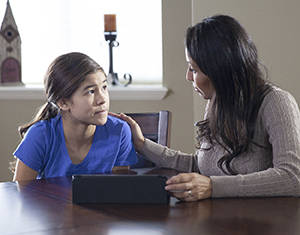When you first get your period, it’s normal to be confused and wonder what’s happening to you. If all your questions aren’t answered here, talk with your healthcare provider, parents, or someone else you trust.
When will I get my first period?
You’ll start having periods when your body is ready. Many girls have their first period about 2 to 3 years after they begin puberty. Girls get their periods at different ages. Try not to compare yourself to your friends. You will each get your period when it is right for your body.
How long is each cycle?
Don’t worry if your period sometimes skips months for the first few years. You might even have a period twice in one month. That’s OK. By the time you’re an adult, it is normal for a cycle (the time from the first day of one period to the first day of your next period) to take 21 to 34 days. That’s why you hear women talk about a “monthly cycle.”
How long does each period last?
Each girl is different, but it’s normal for a period to last 2 to 7 days. Talk to your parents or healthcare provider if your period lasts longer than 8 days for 2 cycles in a row.
What does a period look like?
The lining of the uterus is rich with blood. So the color of your menstrual flow can be pink, red, or brown. The flow can be thick, lumpy, or runny.
How much will I bleed?
For most girls, the amount of flow for an entire period is only 4 teaspoons to 6 teaspoons, although for some girls it may feel like more. Expect the flow to be light on some days and heavier on others.
Can I bleed too much?
During your period, bleeding can look like more than it is. Don’t let this frighten you. But if you ever soak a new pad in 1 hour or less, let your parents know.
Will people know when I have my period?
You are very aware of your period, but you won’t look different to other people. If you glance at yourself in the mirror, you’ll see this is true!
A girl in my school is having a baby. Can that happen to me?
If you have a period and have sex, you can get pregnant. Having periods means that your body is able to create a baby. But you can only get pregnant if your egg meets with male sperm during sex. Sex is something you should talk with your parents or your healthcare provider about. You are still growing. Getting pregnant now wouldn’t be good for your health or the health of a baby. So even if it seems like many girls your age are having sex, do yourself a favor— wait.
Do boys have anything like this?
Boys don’t have periods, but they do go through puberty. They grow body hair, get pimples, and some grow tall very quickly. Many boys feel embarrassed when their voices suddenly change or when they act clumsy. And they get moody, too.
Featured in


